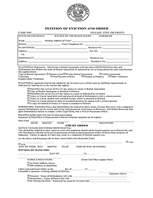
Is it illegal to evict tenant in Massachusetts? Who can file eviction in Massachusetts? What are the reasons for evictions in Massachusetts? The eviction storage law provides important rights to tenants who are facing an eviction or who have been evicted. Massachusetts defense for eviction (MADE): self-guided eviction help, Greater Boston Legal Services.
In Massachusetts , it is illegal for a landlor on his or her own, to remove tenants and occupants and their belongings from a rented apartment, room, or home without first getting a court order. The court case that a landlord files to get a court order is called summary process (the legal term for an eviction ). The landlord or owner can evict someone from their property after receiving a court order. The tenant and any other occupants can be evicted. The most common reasons for evictions in Massachusetts are a tenant failing to pay rent or violating the lease or rental agreement. Massachusetts ’ landlord-tenant laws allow landlords operating within the commonwealth to evict tenants for any of the legally-justified reasons listed here: Nonpayment of rent – If a Massachusetts tenant fails to pay rent on time (including after an applicable grace period),.
Violation of lease. The landlord can sue the tenant for unpaid rent (or for other damages) in either a civil or a small claims case. The landlord may consider this if the tenant owes rent but has moved out before the landlord files an eviction case.
Depending on the reason for eviction , a landlord must provide the tenant either a 14-Day or 30-day Notice to Quit. The procedures for civil actions are governed by the Massachusetts Rules of Civil Procedure. A landlord must then file a civil action (summary process) in court, and get a judgment from the court that specifies the date that the tenant must leave the rental property with their belongings. As a tenant , you have a legal responsibility to pay your landlord for the use of a place that is in decent condition. Massachusetts law also provides you with rights that protect the payments you make to the landlord.
MassLandlords is the landlord trade association for Massachusetts. We have lease agreements , eviction notices, and every other kind of landlord help you need. Membership is open to anyone who rents property, however large or small, and those who can help landlords, like attorneys and contractors.
Landlord-Tenant Law Massachusetts can be considered a tenant -friendly state. If you are a landlor proper execution of a lease agreement is imperative to achieving terms you can rely upon if the tenant does not fulfill his or her obligations. If tenants appear at the hearing but fail to file an answer, the process can take longer (read more). Below are the individual steps of the eviction process in Massachusetts. Most evictions and foreclosures are paused in Massachusetts until Oct.
Charlie Baker approved and then extended. Housing rights groups warn, however, that the. Unauthorized subletting, nonpayment of rent and failure to meet tax or insurance obligations are the most common reasons commercial landlords in Massachusetts seek to evict. Commercial evictions can be costly and the legal process is exacting.

The law halts any “non-essential eviction” of a residential tenant or a for profit or not-for-profit “small business premises” tenant. Non-essential evictions” include all evictions other than those which involve allegations of criminal activity or lease violations which would affect health and safety. On April Massachusetts passed an emergency law to stop evictions and foreclosures during the COVID-state of emergency. How does this law protect me?
Each chapter begins with a 2-page handout with highlights of the chapter.
No comments:
Post a Comment
Note: only a member of this blog may post a comment.